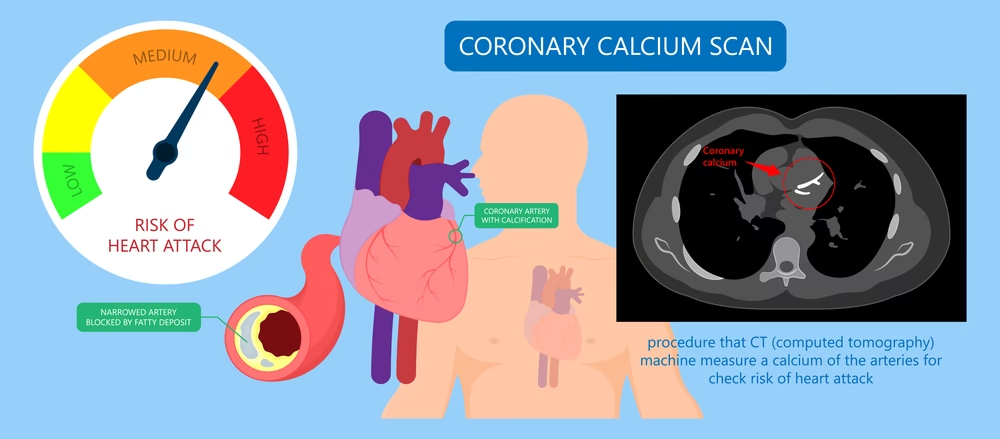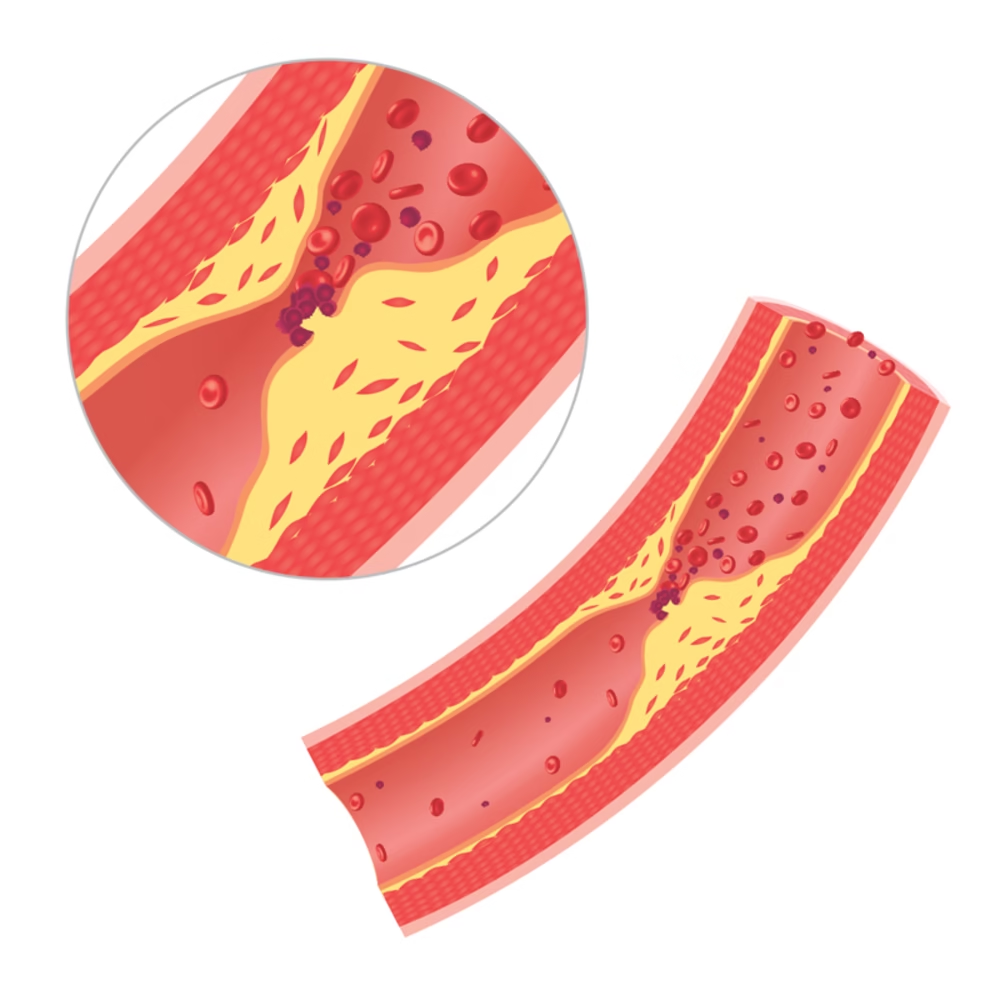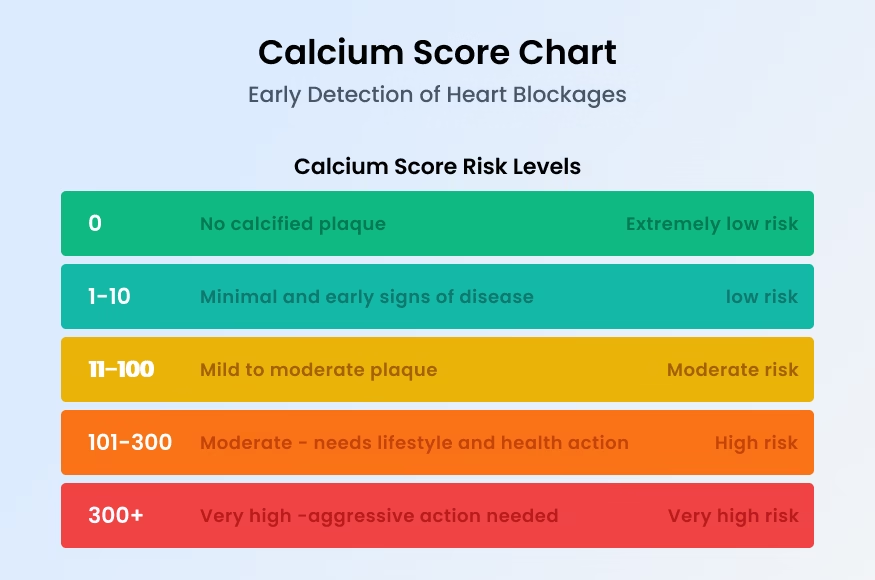You were raised to think of calcium as your best friend. So good for bones, good for teeth, right? But what if we tell you that the very calcium that built your body might also silently harm your heart? Once calcium starts settling inside your arteries, it becomes something entirely different — a warning sign. This process, known as arterial calcification, doesn’t occur overnight. It’s your body’s long, slow response to years of silent inflammation, poor diet, stress, high cholesterol, and unchecked blood sugar.
And this is precisely what the Calcium Score Test reveals.
You’ve done blood pressure checks, lipid tests, stress tests—yet you’re still left wondering, “How bad is my heart?” The answer could be found in a straightforward CT scan that measures the amount of calcium deposited in your arteries. At SAAOL Heartcare Delhi, led by Dr. Bimal Chhajer, we use this calcium score test in conjunction with non-invasive heart treatment such as EECP treatment in Delhi/NCR, providing a non-surgical heart disease treatment option for those looking to avoid bypass surgery, reverse heart disease without surgery, or an alternative to bypass surgery, sometimes years before symptoms appear.
Table of Contents
ToggleWhy Calcium Score Matters More Than You Think
For instance, if you have a ‘coronary artery calcium (CAC)’ score of 0, there’s a good chance your risk of having a heart event over the following 5–10 years is less than 1%. In a meta-analysis of 71,595 asymptomatic adults, a CAC score of 0 correlated with a cardiovascular event rate of only 0.47% over approximately 4 years. Meanwhile, scores over 100 indicate moderate to high risk, and >400 almost always mean you have significant heart artery disease.
This test tells you what no other test can: How much calcified plaque is in your heart’s pipes. Calcium is the scar tissue left behind after artery damage, the residue after your body has been fighting plaque quietly for years.
What Is a CAC Score (Calcium Score)?

A calcium score or CAC (Coronary Artery Calcium), also called the Agatston score, measures:
- Any calcified plaque
- How much and how dense it is, because dense calcium is more difficult for blood to flow past
Scores are placed into the following categories :
- 0 – No calcified plaque (Extremely low risk)
- 1–10 – Least to minimal, if any, early disease of origin
- 11–100 – Plaque may be mild or moderate
- 101–300 – Moderate – it’s a reminder that immediate steps need to be taken at times.
- 300 – Very high — aggressive action needed
And that plaque often starts calcifying a decade before any chest pain or symptom. That’s the power of this test.
Can a Calcium Score Help Prevent a Heart Attack?
Having a calcium score itself doesn’t protect you against a heart attack. It’s not a magic shield. What it does is alert you. Try to look at it as similar to a fire alarm. It doesn’t stop the fire…But it tells you before everything burns. Calcium score finds the “silent” blockages before they become emergencies, such as:
- Heart attacks
- Sudden cardiac death
- Angina (chest pain)
- Heart failure
By getting tested sooner, you can:
- Make lifestyle changes an earlier priority
- Start taking preventive medications (like statins, if necessary)
- Inhibit inflammation and plaque progression
- Explore non-invasive options such as EECP therapy
What Does the Calcium Score Test Tell You That Other Tests Don’t?
“Zero” Score = Superpower
Even in symptomatic Indians, CAC=0 has 98%–99% negative predictive value for obstructive coronary artery disease. It identifies who probably doesn’t need stents or bypass surgery, and can safely delay meds if used alongside other measures.
Score Boosts Precision
In a South Asian population, CAC = 0 was found in ~30% of intermediate-risk individuals, preventing over-treatment.
Predictive Power
A High Calcium score strongly predicts death from heart disease. It outperforms traditional risk calculators (like Framingham) when layered into decision-making.
Surprising Facts About Calcium Score
Calcium ≠ Soft Plaque

CAC only looks at hard, calcified plaque — so a low score doesn’t entirely rule out all disease. Yet calcified plaque is usually older and bigger, and much more stable, or it could be a plaque that has “healed.”
Age Matters
The scores go up with age — you could have a 115 at age 50 — but 380 at 65 means a much higher mortality risk.
It’s a Way In—Not a One-and-Done
Zero score: Maybe test again in 5 years. High score: Maybe start EECP treatment, lifestyle modification, and medicines. But the calcium score is never the final word—just the first piece of insight.
FAQ
Question: What Does a Calcium Score Tell Me?
It quantifies how much calcified plaque is in your heart arteries, helping predict the risk of future heart attacks.
Question: Can I Have Heart Disease Even With a Zero Score in Calcium Test?
Yes—but rare. Indians under 40 with soft plaques can score zero. CAC must be paired with other assessments.
Question: Is a Calcium Score Better Than a Stress Test?
When it comes to Calcium score vs stress test, they do different jobs:
- Calcium score is structural (plaque quantity/density)
- A stress test is functional (how your heart behaves under exertion)
Together, they paint a clearer picture.
Question: How Often Should You Get a Calcium Score?
- If CAC = 0 and low risk, recheck every 5 years.
- If CAC = 1–300 or older with risks, consider every 2–3 years.
What Happens When You Go For CAC Score— A Practical Step-by-Step
Pre-Scan Info
- Low radiation (~1 mSv)
- No IV dye needed
- Quick breath hold
Scan & Score
A CT scan of the heart calculates the Agatston score
Interpretation
- Context: age, gender, risk factors
- A score of >100 needs discussion, >300 demands action
Plan Forward
- Lifestyle: Zero-oil Diet, Exercise, and Stress Management
- Medications if needed
- EECP therapy in Delhi/NCR to help build collateral circulation
- Non-invasive heart treatment with Dr Bimal Chhajer’s heart program
Follow-Up
- CAC = 0 → reassess in 5 years
- High → treat & re-evaluate in 2–3 years
Why This Matters to You
Let’s be clear, 90% of cardiovascular diseases are preventable. Your next heart event may depend on finding plaque before it clogs your artery. For South Asians, calcium scans detect risk years before symptoms appear. And if an imaging study shows calcification, you don’t have to rush to the OR. You have time—if you choose the right path. At SAAOL Heartcare Delhi, we use Calcium Score Test + EECP + Lifestyle modification properly to help you avoid bypass surgery and to reverse heart disease without surgery, under the care of Dr. Bimal Chhajer. If you want more clarity and action, you may meet experts at SAAOL Heartcare Delhi and talk to them about your calcium score.
It could conceivably change your life before anything else ever does.


